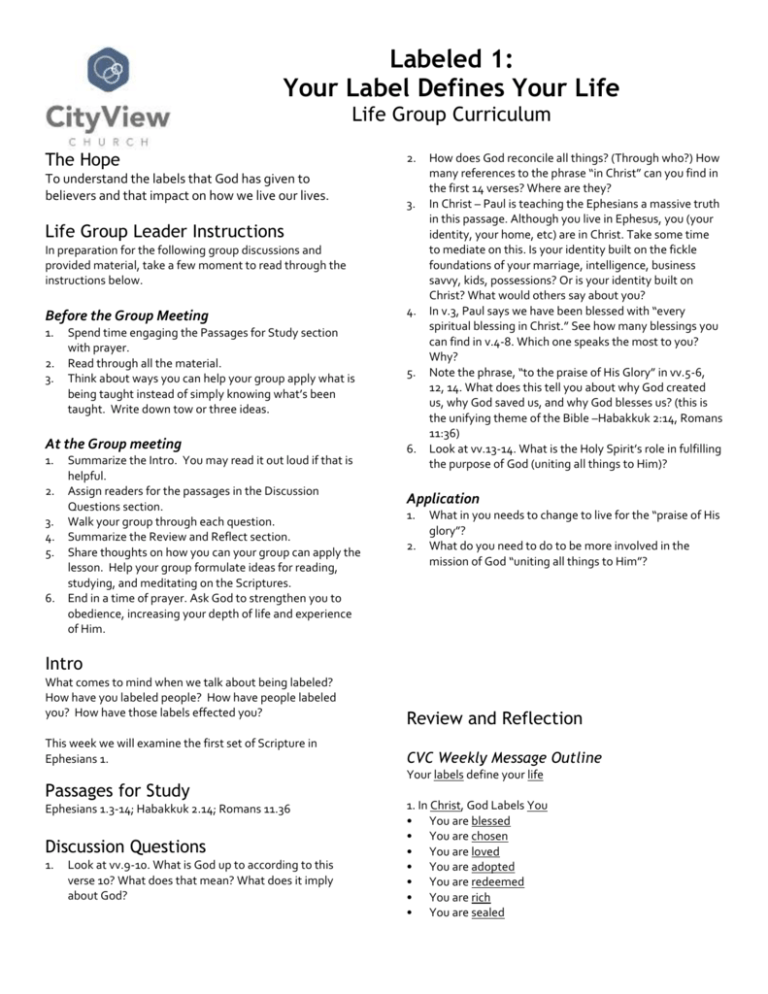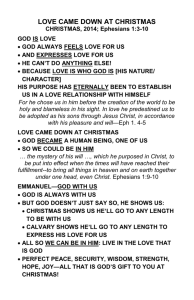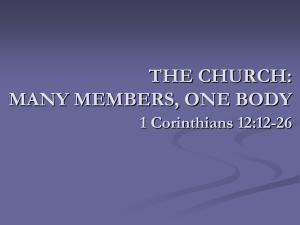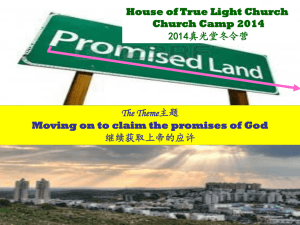Labeled 1 – Life Group Sheet (9/13/15)
advertisement

Labeled 1: Your Label Defines Your Life Life Group Curriculum The Hope To understand the labels that God has given to believers and that impact on how we live our lives. 2. 3. Life Group Leader Instructions In preparation for the following group discussions and provided material, take a few moment to read through the instructions below. Before the Group Meeting 1. 2. 3. Spend time engaging the Passages for Study section with prayer. Read through all the material. Think about ways you can help your group apply what is being taught instead of simply knowing what’s been taught. Write down tow or three ideas. At the Group meeting 1. 2. 3. 4. 5. 6. Summarize the Intro. You may read it out loud if that is helpful. Assign readers for the passages in the Discussion Questions section. Walk your group through each question. Summarize the Review and Reflect section. Share thoughts on how you can your group can apply the lesson. Help your group formulate ideas for reading, studying, and meditating on the Scriptures. End in a time of prayer. Ask God to strengthen you to obedience, increasing your depth of life and experience of Him. 4. 5. 6. How does God reconcile all things? (Through who?) How many references to the phrase “in Christ” can you find in the first 14 verses? Where are they? In Christ – Paul is teaching the Ephesians a massive truth in this passage. Although you live in Ephesus, you (your identity, your home, etc) are in Christ. Take some time to mediate on this. Is your identity built on the fickle foundations of your marriage, intelligence, business savvy, kids, possessions? Or is your identity built on Christ? What would others say about you? In v.3, Paul says we have been blessed with “every spiritual blessing in Christ.” See how many blessings you can find in v.4-8. Which one speaks the most to you? Why? Note the phrase, “to the praise of His Glory” in vv.5-6, 12, 14. What does this tell you about why God created us, why God saved us, and why God blesses us? (this is the unifying theme of the Bible –Habakkuk 2:14, Romans 11:36) Look at vv.13-14. What is the Holy Spirit’s role in fulfilling the purpose of God (uniting all things to Him)? Application 1. 2. What in you needs to change to live for the “praise of His glory”? What do you need to do to be more involved in the mission of God “uniting all things to Him”? Intro What comes to mind when we talk about being labeled? How have you labeled people? How have people labeled you? How have those labels effected you? This week we will examine the first set of Scripture in Ephesians 1. Passages for Study Ephesians 1.3-14; Habakkuk 2.14; Romans 11.36 Discussion Questions 1. Look at vv.9-10. What is God up to according to this verse 10? What does that mean? What does it imply about God? Review and Reflection CVC Weekly Message Outline Your labels define your life 1. In Christ, God Labels You • You are blessed • You are chosen • You are loved • You are adopted • You are redeemed • You are rich • You are sealed Labeled 1: Your Label Defines Your Life Life Group Curriculum 2. In You, God Reveals His Label of Himself: GRACIOUS Commentary AUTHOR | RECIPIENTS: The letter begins by identifying the author (PAUL) and the recipients (Ephesus). “Paul, an apostle of Christ Jesus, by the will of God.” Acts provides the primary pieces of background information: Acts 7:58, 8:1-3, 9:1-31, 13:1-28:31. He is a man changed by the gospel and commissioned with the Gospel of Jesus Christ. He ended up writing 13 books of the NT (14 if he wrote Hebrews). Romans 15:20 tells us his ambition was to take the Gospel where Christ had not been named. He was a man consumed with the Glory of God (Phil 1:20-21). Paul wrote to the church in Ephesus. Ephesus was a large city, 250,000- 300,000 people. It was the most important city in the Roman province known as Asia, modern day Turkey. It was called the gateway to Asia. Its theater was the size of a modern football stadium, seating close to 50,000 people. Like people in our day, the people of Ephesus were very spiritual. They had few atheists, but a city full of idolaters. Their “god or goddess” of choice was “Diana” (Roman name) or “Artemis” (Greek name). She was housed in the Temple of Diana, one of seven “Wonders of the World.” THEME: Ephesians 1:3-14 is one long and elegant sentence in the Greek language. In this sentence Paul introduces the main theme of the book. Ephesians 1:9-10, “making known to us the mystery of his will, according to his purpose, which he set forth in Christ as a plan for the fullness of time, to unite all things in him, things in heaven and things on earth.” Martin Lloyd Jones, a pastor/preacher of a few generations ago said this about these two verses: “I do not hesitate to assert that we have in this verse the key to understanding the chief practical purpose of the letter to the Ephesians, even more- the entire message of the Bible.” Take a second to stop and mediate on this precious truth. KEY PHRASE: Look for this key phrase in the 1:1-14, “in Christ,” or a variation of it. You should be able to find 11 references in the first 14 verses, 35 references in the letter, and 164 references to that phrase throughout the writings of Paul. Our peace with God, redemption, adoption, blessings, the riches of God’s inheritance, only comes “in Christ.” This is the identity of a follower of Jesus. FINAL THOUGHT: Lastly, Paul introduces some words that take discussions to the “deep end of the pool” very quickly. He uses terms like “he chose us (1:4), he predestined us (1:5), having been predestined (1:11).” These words have been known to stir up controversy. I want you to notice the context in which Paul uses these words. Look at 1:3, he begins the sentence by saying “Blessed be the God and Father of our Lord Jesus Christ, who has blessed us in Christ with every spiritual blessing.” For Paul these words aren’t controversial. For Paul these words bring a sense of joyful praise to God, a want to bless the name of God! God aiming his love or setting his love on us before the foundation of the world should do the same for our heart!









